-
 Bitcoin
Bitcoin $103,609.1372
0.27% -
 Ethereum
Ethereum $2,566.1624
1.03% -
 Tether USDt
Tether USDt $1.0002
0.00% -
 XRP
XRP $2.4000
-1.17% -
 BNB
BNB $647.3301
-0.91% -
 Solana
Solana $169.3988
0.11% -
 USDC
USDC $0.9998
-0.03% -
 Dogecoin
Dogecoin $0.2239
1.64% -
 Cardano
Cardano $0.7657
0.09% -
 TRON
TRON $0.2733
0.12% -
 Sui
Sui $3.8517
0.05% -
 Chainlink
Chainlink $15.9131
-0.74% -
 Avalanche
Avalanche $23.2833
-0.58% -
 Stellar
Stellar $0.2942
0.40% -
 Hyperliquid
Hyperliquid $27.3968
6.80% -
 Shiba Inu
Shiba Inu $0.0...01478
-0.04% -
 Hedera
Hedera $0.1975
-0.51% -
 UNUS SED LEO
UNUS SED LEO $8.8633
0.56% -
 Bitcoin Cash
Bitcoin Cash $398.7793
1.12% -
 Toncoin
Toncoin $3.1670
2.78% -
 Polkadot
Polkadot $4.8147
0.72% -
 Litecoin
Litecoin $99.5101
-0.01% -
 Monero
Monero $334.4500
-0.44% -
 Bitget Token
Bitget Token $5.0120
3.86% -
 Pepe
Pepe $0.0...01315
0.09% -
 Pi
Pi $0.7665
-13.29% -
 Dai
Dai $0.9999
0.00% -
 Ethena USDe
Ethena USDe $1.0009
0.04% -
 Uniswap
Uniswap $6.1850
-0.62% -
 Bittensor
Bittensor $437.4102
0.64%
Does zero-knowledge proof require a third party? How to achieve trustlessness?
Zero-knowledge proofs are designed to be trustless, not requiring a third party, by leveraging mathematical soundness and zero-knowledge properties for privacy and security.
May 16, 2025 at 10:56 pm
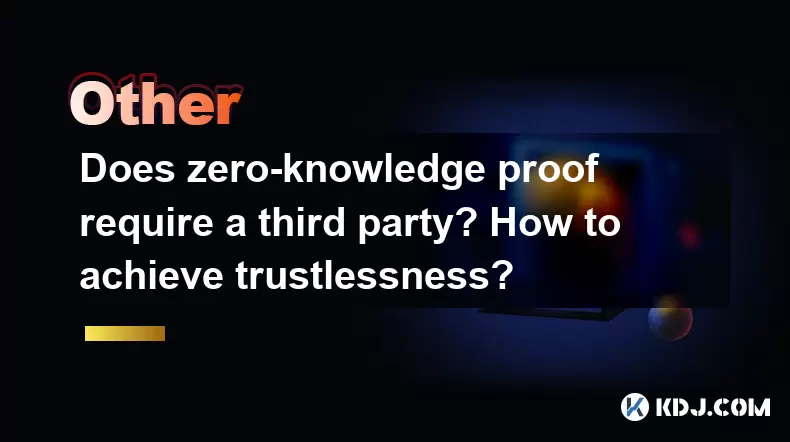
Does zero-knowledge proof require a third party? How to achieve trustlessness?
Zero-knowledge proofs (ZKPs) are cryptographic protocols that allow one party (the prover) to prove to another party (the verifier) that a given statement is true, without revealing any information beyond the validity of the statement itself. A common question that arises is whether zero-knowledge proofs require a third party to function effectively, and how trustlessness can be achieved in such systems.
Understanding Zero-Knowledge Proofs
Zero-knowledge proofs are designed to ensure privacy and security in various applications, including blockchain and cryptocurrency transactions. The core idea is to enable a prover to convince a verifier of the truth of a statement without disclosing any underlying data. This is particularly useful in scenarios where privacy is paramount, such as in financial transactions on a blockchain.
The Role of Third Parties in Zero-Knowledge Proofs
Traditionally, cryptographic systems might rely on a third party to facilitate trust between the prover and the verifier. However, zero-knowledge proofs are designed to be trustless, meaning they do not inherently require a third party to function. The trustlessness of ZKPs stems from the mathematical properties of the proofs themselves, which ensure that the verifier can be convinced of the truth of a statement without needing to trust the prover or any intermediary.
Achieving Trustlessness in Zero-Knowledge Proofs
To achieve trustlessness in zero-knowledge proofs, several key elements must be in place:
Mathematical Soundness: The proof must be mathematically sound, meaning that it is impossible for a dishonest prover to convince the verifier of a false statement. This is ensured through the use of complex mathematical algorithms that are difficult to manipulate.
Zero-Knowledge Property: The proof must reveal no information beyond the validity of the statement. This ensures that the verifier learns nothing about the underlying data, maintaining the privacy of the prover.
Completeness: The proof must be complete, meaning that an honest prover can always convince an honest verifier of a true statement. This ensures that the system works as intended when all parties are acting honestly.
Efficiency: The proof must be efficient enough to be practical for real-world applications. This includes considerations of computational resources and time required to generate and verify the proof.
Practical Implementation of Trustless Zero-Knowledge Proofs
In practice, achieving trustlessness in zero-knowledge proofs involves several steps:
Choosing the Right Protocol: Different zero-knowledge proof protocols, such as zk-SNARKs (Zero-Knowledge Succinct Non-Interactive Arguments of Knowledge) and zk-STARKs (Zero-Knowledge Scalable Transparent Arguments of Knowledge), offer varying levels of efficiency and security. Selecting the appropriate protocol for the specific use case is crucial.
Implementation and Testing: Once a protocol is chosen, it must be implemented correctly and thoroughly tested. This includes ensuring that the implementation adheres to the mathematical properties required for trustlessness.
Verification Process: The verifier must be able to independently verify the proof without relying on any third party. This involves running the verification algorithm on the provided proof and ensuring that it meets the criteria for validity.
Examples of Trustless Zero-Knowledge Proofs in Cryptocurrencies
Several cryptocurrencies and blockchain platforms have implemented zero-knowledge proofs to enhance privacy and security. For instance:
Zcash: Zcash uses zk-SNARKs to enable private transactions on its blockchain. Users can prove that they have the necessary funds to complete a transaction without revealing the amount or the recipient.
Ethereum: Ethereum has explored the use of zk-SNARKs and zk-STARKs to improve the scalability and privacy of its network. Projects like zkSync and Loopring utilize zero-knowledge proofs to facilitate off-chain transactions that can be settled on the Ethereum blockchain.
Detailed Steps to Implement a Trustless Zero-Knowledge Proof System
Implementing a trustless zero-knowledge proof system involves several detailed steps:
Define the Statement: Clearly define the statement that the prover needs to prove to the verifier. This could be something like "I have the necessary funds to complete this transaction."
Generate the Proof: Use the chosen zero-knowledge proof protocol to generate the proof. This involves running the prover algorithm on the statement and any necessary inputs.
Transmit the Proof: Send the generated proof to the verifier. This can be done through a direct communication channel or via a blockchain network.
Verify the Proof: The verifier runs the verification algorithm on the received proof. If the proof is valid, the verifier is convinced of the truth of the statement without learning any additional information.
Integration with Blockchain: If the zero-knowledge proof is being used in a blockchain context, integrate the proof verification process into the blockchain's consensus mechanism. This ensures that the proof is verified as part of the transaction validation process.
Frequently Asked Questions
Q: Can zero-knowledge proofs be used for any type of statement?
A: Zero-knowledge proofs can be used for a wide range of statements, but the complexity of the statement can affect the efficiency and practicality of the proof. Simple statements, such as proving ownership of a certain amount of cryptocurrency, are more straightforward to implement than more complex statements.
Q: How do zero-knowledge proofs impact the scalability of blockchain networks?
A: Zero-knowledge proofs can enhance the scalability of blockchain networks by enabling off-chain transactions that can be settled on the blockchain. This reduces the load on the network and allows for faster transaction processing. However, the computational resources required to generate and verify proofs can also impact scalability.
Q: Are there any known vulnerabilities in zero-knowledge proof systems?
A: While zero-knowledge proof systems are designed to be secure, there have been instances where vulnerabilities were discovered in specific implementations. These vulnerabilities often relate to the implementation details rather than the underlying mathematical principles. Regular audits and updates are essential to maintain the security of zero-knowledge proof systems.
Q: How do zero-knowledge proofs compare to other privacy-enhancing technologies in cryptocurrencies?
A: Zero-knowledge proofs offer a high level of privacy and security compared to other technologies like ring signatures and confidential transactions. While ring signatures and confidential transactions can provide anonymity and hide transaction amounts, zero-knowledge proofs can prove the validity of a statement without revealing any underlying data, offering a more comprehensive privacy solution.
Disclaimer:info@kdj.com
The information provided is not trading advice. kdj.com does not assume any responsibility for any investments made based on the information provided in this article. Cryptocurrencies are highly volatile and it is highly recommended that you invest with caution after thorough research!
If you believe that the content used on this website infringes your copyright, please contact us immediately (info@kdj.com) and we will delete it promptly.
- Bitcoin (BTC) market takes a pause to consolidate
- 2025-05-17 05:20:13
- TradeSta Expands Market Access by Listing $FART with Up to 100x Leverage
- 2025-05-17 05:20:13
- The Best Cryptos to Buy This Week: Qubetics (TICS), Tron (TRX), and Toncoin (TON)
- 2025-05-17 05:15:13
- Shiba Inu (SHIB) Closes In on 410 Trillion Token Milestone in Its SHIB Burn Initiative
- 2025-05-17 05:15:13
- Ethereum (ETH) Price Holds Firm Above $2,500 Despite Broader Market Hesitation
- 2025-05-17 05:10:13
- Solana (SOL), Cardano (ADA), and TRON (TRX) Have All Seen a Renewed Burst
- 2025-05-17 05:10:13
Related knowledge
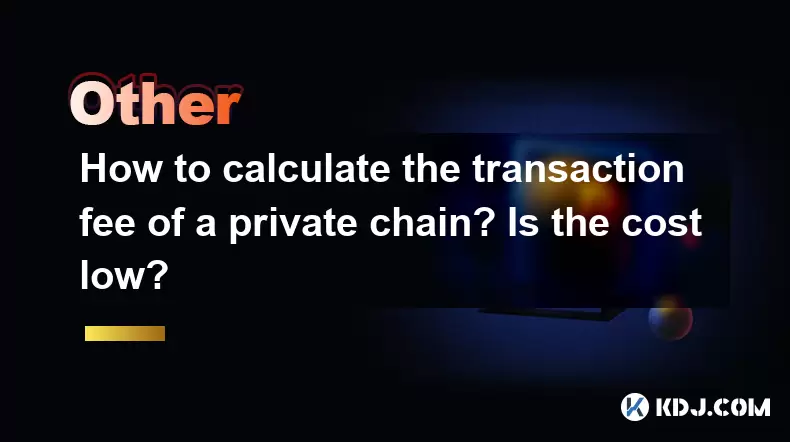
How to calculate the transaction fee of a private chain? Is the cost low?
May 16,2025 at 05:14am
How to Calculate the Transaction Fee of a Private Chain? Is the Cost Low? In the world of cryptocurrencies, understanding the transaction fees associated with different types of blockchains, including private chains, is crucial for users and developers alike. A private chain, also known as a permissioned blockchain, is a blockchain network where access ...
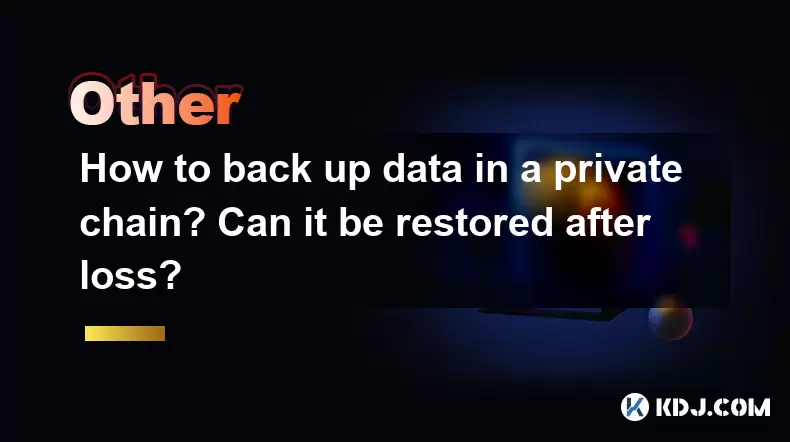
How to back up data in a private chain? Can it be restored after loss?
May 16,2025 at 12:36pm
Introduction to Private Chain Data BackupBacking up data in a private chain is crucial for maintaining the integrity and continuity of your blockchain operations. Private chains, also known as permissioned blockchains, are used by organizations to ensure data privacy and control over network participants. In this article, we will explore the methods for...
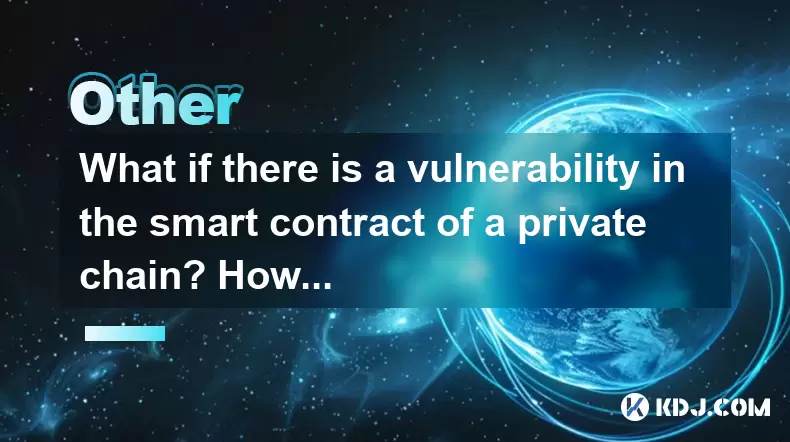
What if there is a vulnerability in the smart contract of a private chain? How to fix it?
May 15,2025 at 08:02pm
Introduction to Smart Contract Vulnerabilities in Private ChainsSmart contracts are self-executing programs that run on blockchain technology, designed to automate transactions and enforce agreements. While they offer numerous benefits, such as transparency and immutability, they are not immune to vulnerabilities. When a vulnerability is found in the sm...
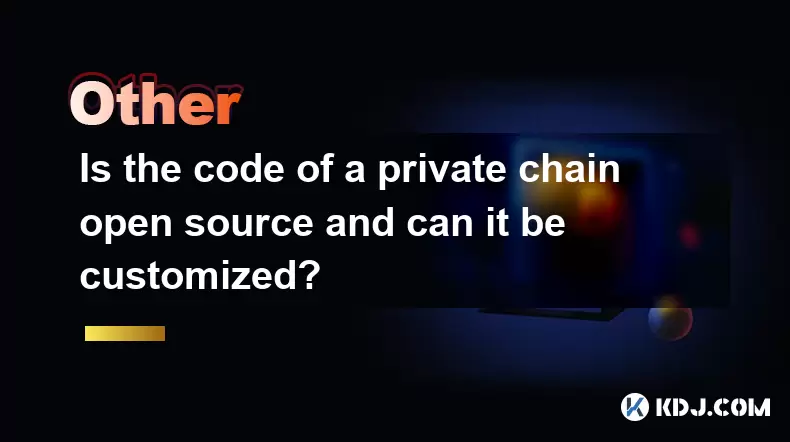
Is the code of a private chain open source and can it be customized?
May 15,2025 at 09:49pm
In the world of cryptocurrencies and blockchain technology, private chains or permissioned blockchains have become a topic of interest for many enterprises and organizations. A private chain is a blockchain network where access is restricted to a specific group of participants, as opposed to public blockchains like Bitcoin and Ethereum, which are open t...
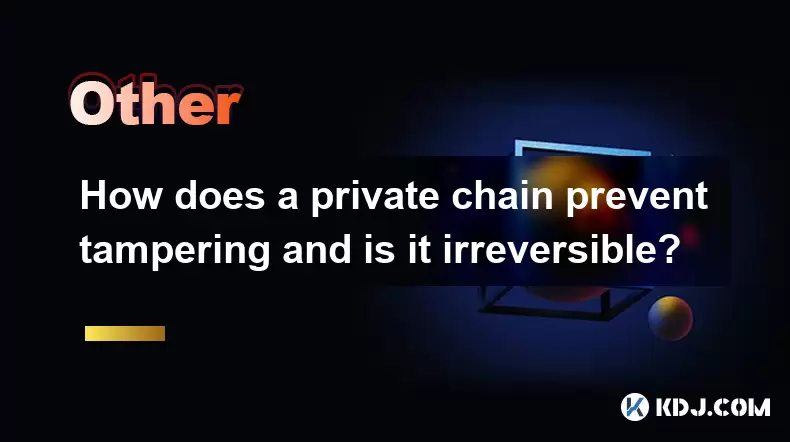
How does a private chain prevent tampering and is it irreversible?
May 17,2025 at 03:01am
Understanding Private ChainsA private chain is a type of blockchain network where access and participation are restricted to a select group of participants. Unlike public blockchains, which are open to anyone, private chains are typically used by organizations or consortia to maintain privacy and control over their transactions and data. This structure ...
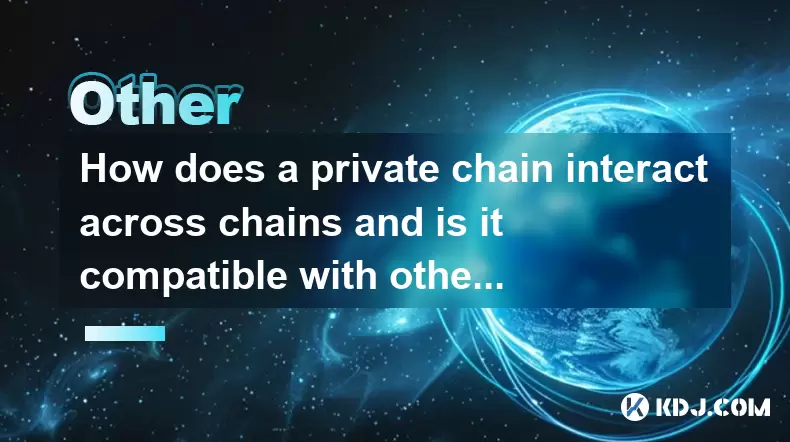
How does a private chain interact across chains and is it compatible with other chains?
May 15,2025 at 04:07pm
Understanding Private Chains and Their FunctionalityA private chain, also known as a permissioned blockchain, is a type of blockchain network where access and participation are controlled by a single organization or a consortium of organizations. Unlike public blockchains, where anyone can join and participate, private chains are restricted to a select ...

How to calculate the transaction fee of a private chain? Is the cost low?
May 16,2025 at 05:14am
How to Calculate the Transaction Fee of a Private Chain? Is the Cost Low? In the world of cryptocurrencies, understanding the transaction fees associated with different types of blockchains, including private chains, is crucial for users and developers alike. A private chain, also known as a permissioned blockchain, is a blockchain network where access ...

How to back up data in a private chain? Can it be restored after loss?
May 16,2025 at 12:36pm
Introduction to Private Chain Data BackupBacking up data in a private chain is crucial for maintaining the integrity and continuity of your blockchain operations. Private chains, also known as permissioned blockchains, are used by organizations to ensure data privacy and control over network participants. In this article, we will explore the methods for...

What if there is a vulnerability in the smart contract of a private chain? How to fix it?
May 15,2025 at 08:02pm
Introduction to Smart Contract Vulnerabilities in Private ChainsSmart contracts are self-executing programs that run on blockchain technology, designed to automate transactions and enforce agreements. While they offer numerous benefits, such as transparency and immutability, they are not immune to vulnerabilities. When a vulnerability is found in the sm...

Is the code of a private chain open source and can it be customized?
May 15,2025 at 09:49pm
In the world of cryptocurrencies and blockchain technology, private chains or permissioned blockchains have become a topic of interest for many enterprises and organizations. A private chain is a blockchain network where access is restricted to a specific group of participants, as opposed to public blockchains like Bitcoin and Ethereum, which are open t...

How does a private chain prevent tampering and is it irreversible?
May 17,2025 at 03:01am
Understanding Private ChainsA private chain is a type of blockchain network where access and participation are restricted to a select group of participants. Unlike public blockchains, which are open to anyone, private chains are typically used by organizations or consortia to maintain privacy and control over their transactions and data. This structure ...

How does a private chain interact across chains and is it compatible with other chains?
May 15,2025 at 04:07pm
Understanding Private Chains and Their FunctionalityA private chain, also known as a permissioned blockchain, is a type of blockchain network where access and participation are controlled by a single organization or a consortium of organizations. Unlike public blockchains, where anyone can join and participate, private chains are restricted to a select ...
See all articles























































































